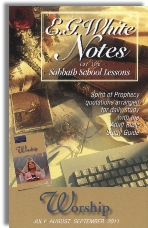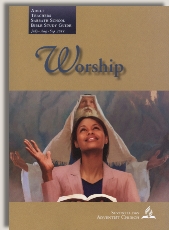|
||||||||||||||
Commentary on "Worship in the Early Church"
Day 5: Wednesday, September 14, 2011 - Worship "Contrary to the Law"
Overview
This lesson examines worship in the larger context of our lives, rather than just what happens during church. It presents an idea about what makes for authentic worship and emphasizes the responsibility of the individual believer in worship.
The lesson also looks at the accusation that Paul was teaching people to worship "contrary to the law".
Observations
The lesson correctly points out that "worship is not just about what you do in church on Sabbath". However, the lesson is incorrect in the assumption that Sabbath is about worship. As discussed in previous weeks' lessons, there is nothing in the Sabbath command about worship.
Perhaps the strong point of this entire lesson is found when it points out that worship involves our whole lives. At this point, the lesson could have directed readers to Rom 12:1:
I appeal to you therefore, brothers, by the mercies of God, to present your bodies as a living sacrifice, holy and acceptable to God, which is your spiritual worship.(ESV)
In the Old Covenant, the priests offered sacrifices. But the New Covenant brings a new law (Hebrews 7:12), no longer is God looking for a special tribe of priests to offer animals as sacrifices. Instead, God looks to each of us, in the priesthood of all believers, to offer not animals, but ourselves to Him. And God calls this offering, "spiritual worship".
The lesson claims that "worship is primarily about God and the actions of God in History". How is worship only "primarily" about God? Isn't it completely about God? And what is the purpose of adding in the statement of worship being about "the actions of God in History"?
The lesson also states that "worship should draw participants into a closer walk with their Lord". This common misconception overlooks the nature of the indwelling Holy Spirit sealing believers (Eph 1:13-14, 2 Cor 1:22). If God is literally dwelling in us, how can we possibly walk any closer to Him than we already are?
The emphasis in the lesson on our experiencing a closer walk with God and on our feelings of awe and reverence, appears to transfer some of the focus of worship from God to us. Is worship about what we do or about what we feel? The lesson seems to talk more about how we feel and what we experience.
One statement in the lesson really points out an error that is central to Seventh-day Adventist thinking on the whole and therefore flavors thoughts about worship as well. The lesson states that "In the end, it comes down to ourselves…" According to the lesson, we are the ones responsible for our experience in worship. In a society where personal accountability can be lacking, this is a message that tickles our ears, "we are responsible for ourselves". And what a natural part of a theology that teaches we are responsible for perfecting our characters, and we are responsible for making ourselves ready for heaven. But this is a thought process that robs God of being God over everything. In the end neither worship nor our fitness for heaven come down to ourselves, it all comes down to God.
The lesson attributes the accusations against Paul as being the result of people being "caught up in traditions". This comment about "traditions" is an addition to Scripture that lessens the impact of what is actually written. Paul, and the church as a whole, did teach "contrary to Law" because they taught in accordance with the New Covenant, not according the Old Covenant. For instance, the question of whether the Gentiles joining the church were required to obey all of the Jewish laws was directly addressed by the early church in Acts 15.
Acts 15:5 But some believers who belonged to the party of the Pharisees rose up and said, “It is necessary to circumcise them and to order them to keep the law of Moses.” 6 The apostles and the elders were gathered together to consider this matter. (ESV)
Acts 15: 19 Therefore my judgment is that we should not trouble those of the Gentiles who turn to God, 20 but should write to them to abstain from the things polluted by idols, and from sexual immorality, and from what has been strangled, and from blood… 28 For it has seemed good to the Holy Spirit and to us to lay on you no greater burden than these requirements: 29a that you abstain from what has been sacrificed to idols, and from blood, and from what has been strangled, and from sexual immorality (ESV)
The early church did not require gentiles to observe the law of Moses. But this wasn't always received well in the churches, as the New Testament epistles have numerous accounts of Jewish believers attempting to subject newly converted Christians to the Jewish Laws. So there is no reason to introduce "traditions" as what Paul was teaching contrary to, Paul, and the church, were teaching that the Law of Moses didn't apply to converts. For instance, the Law teaches that a person must become circumcised in order to participate in all aspects of worship.
Ex 12: 43 And the Lord said to Moses and Aaron, “This is the statute of the Passover: no foreigner shall eat of it, 44 but every slave that is bought for money may eat of it after you have circumcised him. 45 No foreigner or hired servant may eat of it. 46 It shall be eaten in one house; you shall not take any of the flesh outside the house, and you shall not break any of its bones. 47 All the congregation of Israel shall keep it. 48 If a stranger shall sojourn with you and would keep the Passover to the Lord, let all his males be circumcised. Then he may come near and keep it; he shall be as a native of the land. But no uncircumcised person shall eat of it. (ESV)
When Paul and the church taught that circumcision wasn't necessary, they were teaching contrary to the Law, not just contrary to traditions. But Paul went even further than this in his teaching on circumcision, he taught that for a gentile convert to accept circumcision was to void his faith.
Gal 5: 2 Look: I, Paul, say to you that if you accept circumcision, Christ will be of no advantage to you. 3 I testify again to every man who accepts circumcision that he is obligated to keep the whole law. 4 You are severed from Christ, you who would be justified by the law; you have fallen away from grace. (ESV)
Paul's teaching on circumcision is diametrically opposed to the Law. The same holds true of Paul's teaching on the Sabbath (Rom 14:1-5; Gal 4:8-11; and Col 2:16) although most Seventh-day Adventists are too entrenched in this doctrine to consider any alternatives.
Summary
This lesson strays significantly from Scripture. The first half of the lesson makes a number of claims about worship, but avoids any Scriptural discussion or support for these claims. And when the claims are examined a little more closely, the reason that Scripture is avoided is clear. Scripture does not support the claims being made. Even when the lesson finally turns to Scripture in the final half, we find a serious change being made to the reading of the passage. By telling the readers that the laws being ignored by Paul were only traditions, rather than the actual Law of Moses, the lesson presents very different conclusions from what Scripture would teach were it allowed to be understood as it is written. The cross and the resurrection were game changers. The old ways, the old laws of worship, went to the grave with Christ. But when Christ arose as our High Priest, there was also a change in the laws of our worship. Consider this, if the Laws of Moses were not changed with Christ's death and resurrection then Christ is breaking the Law by serving as our High Priest. But the changes in Law extended far beyond changes in the priesthood. And these changes made Jews, even some of those who accepted Christ as the Messiah, uncomfortable and resulted in the charges that Paul was teaching people to worship contrary to the Law. Trying to understand this charge against Paul without discussing the change in covenants is a fruitless exercise in personal opinions and speculations.
Copyright 2011 BibleStudiesForAdventists.com. All rights reserved. Revised August 22, 2011. This website is published by Life Assurance Ministries, Glendale, Arizona, USA, the publisher of Proclamation! Magazine. Contact email: BibleStudiesForAdventists@gmail.com.
The Sabbath School Bible Study Guide and the corresponding E.G. White Notes are published by Pacific Press Publishing Association, which is owned and operated by the Seventh-day Adventist church. The current quarter's editions are pictured above.
Official Adventist Resources
Standard Edition Study Guide Week 12
Teacher's Edition Study Guide Week 12
Easy Reading Edition Study Guide Wk 12
Search the Complete Published Ellen G. White Writings
Please Support This Project


